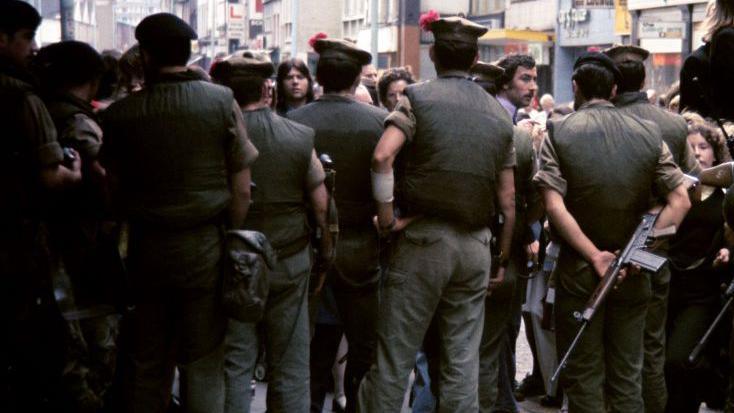Government to challenge Legacy Act court ruling

More than 3,500 people lost their lives during the 30-year conflict in Northern Ireland
- Published
The government looks set to challenge a Court of Appeal ruling on the Legacy Act brought by a number of Troubles victims' families - despite plans to repeal it.
In a statement, the Northern Ireland Office (NIO) confirmed it has lodged an application seeking leave to appeal.
It follows a ruling handed down by judges in Belfast last month.
The Legacy Act was brought in by the last government and came into effect in May.
Labour has pledged to address the concerns of victims' groups by replacing the act and is currently consulting on the issue.
But it intends keeping the new legacy body, the Independent Commission for Reconciliation and Information Recovery (ICRIR).
The Court of Appeal found the act was in breach of human rights law and the Windsor Framework.
The government's legal response was first reported by the Reuters news agency on Friday night.
In a statement, the NIO said it fully intends repealing and replacing the act.
It went on: "It is absolutely clear that changes to the act are necessary to ensure it is human rights compliant.
"That is why the government has already committed to bringing forward a remedial order under the Human Rights Act, and to reforming the ICRIR.
"The Court of Appeal judgment is complex and wide-ranging.
"We require further time to consider fully its implications and next steps, and intend to bring clarity and certainty as soon as possible.
"In the meantime, the government has lodged an application with the Court of Appeal seeking leave to appeal the judgment."
What is the Northern Ireland Troubles (Legacy and Reconciliation) Act?
The act was passed by the Conservative government in September 2023 despite opposition from Labour, all Northern Ireland parties, several victims' groups and the Irish government.
It created a new legacy body known ICRIR to take over all Troubles-era cases from 1 May 2024, including those on the desk of the Police Service of Northern Ireland.
The act shuts down all historical inquests.
The act's most controversial element, the offer of conditional immunity to suspects, has been disapplied following legal action by bereaved families.
The court ruled this part of the act was incompatible with human rights' legislation and the Windsor Framework.
In late July, the Labour government wrote to the Belfast courts abandoning an appeal against the striking out of the amnesty clause in the legislation.
Related topics
- Published20 September 2024

- Published29 August 2024
